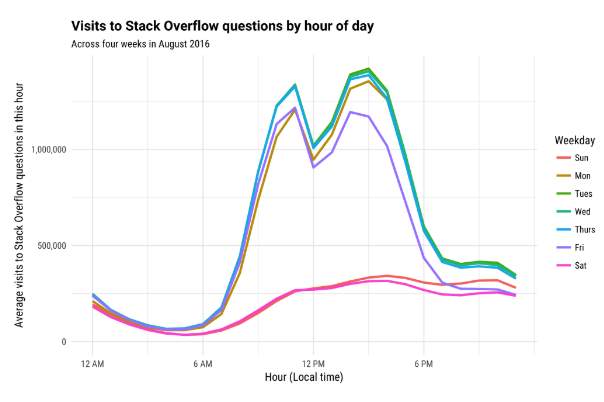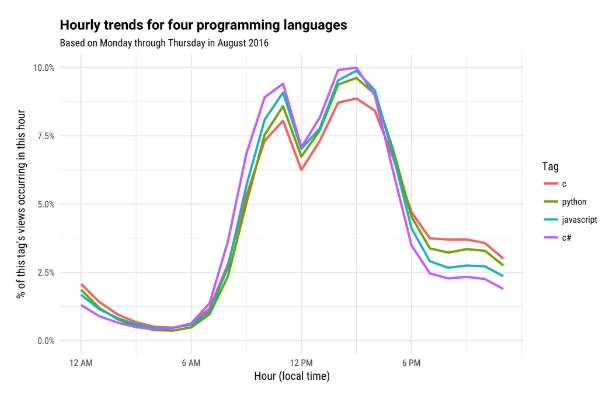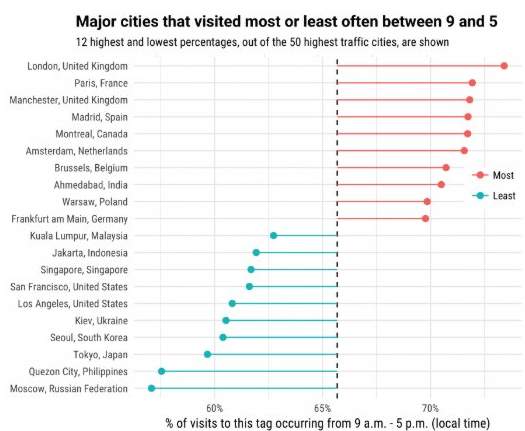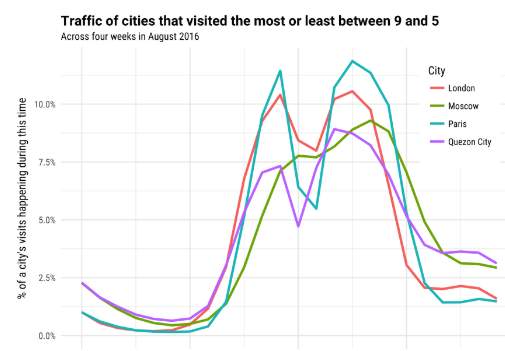| Larks and Night Owls of the Programming World |
| Written by Janet Swift | |||
| Thursday, 20 April 2017 | |||
|
Stack Overflow has produced an interesting analysis of developers working habits that reveals differences that depend on your choice of language. It turns out that C# programmers tend to be early birds; whereas those using C start later and work on into the evening and that London and Paris follow the strictest 9 to 5 working day. Programming isn't a good fit for a 9 to 5 activity. If you are working on a complex program, it isn't easy to put to one side simply because the clock tells you to. On the other hand if you work for a company then there is a pressure to keep to office hours. A recent post on the Stack Overflow blog by Data Scientist David Robinson addresses the question What programming languages are used late at night? Before presenting the data he explains: I enjoy programming as a hobby and I’m a bit of a night owl, so I often code well outside working hours, sometimes past midnight. And whatever time it is, when I run into a bug I visit Stack Overflow. This means that Stack Overflow data can give us insights into what kinds of developers program in the evening or night, and conversely what programming languages are used only during the workday. In this post, we’ll examine what tags are visited at what times a day, and also compare major cities to see how their working hours differ. In his first chart we are shown the pattern of visits to Stack Overflow during the 24-hour period on different days of the week adjusted for local time of the visitor. (Click in chart to enlarge) It shows that on weekdays traffic between 9 and 5 is generally over 1 million visits per hour with a distinct dip around lunchtime. At the weekend there is only around a quarter of the traffic in the 9 to 5 period, but almost as much between midnight and dawn. Noting that traffic on Friday afternoon and evening is lower than the other weekdays the analyisis in the rest of the post uses data for Mondays through Thursdays. The chart that answers the question posed in the blog post title singles out C#, Python, JavaScript and C, normalizing to "percentage of visits" in order to make the comparison: (Click in chart to enlarge) Robinson comments: We can see that the overall trend is similar across the languages: programmers of all types use Stack Overflow at their jobs, go to sleep at night, take a break for lunch, and so on. However:
Although only the results for four languages are included in this chart, the analysis covered 250 tags used to label Stack Overflow questions. Findings that Robinson pulls out in his write-up include: The technologies used predominantly during the workday include many Microsoft technologies, such as SQL Server, Excel, VBA, and Internet Explorer, as well as technologies like SVN and Oracle that are frequently used at enterprise software companies. On the other side, many of the technologies used outside the workday include web frameworks like Firebase, Meteor, and Express, as well as graphics libraries like OpenGL and Unity. The functional language Haskell is the tag most visited outside of the workday; only half of its visits happen between 9 and 5. Robinson also uses the data to comment on where the 9 to 5 working day prevails. Having analysed the 50 cities with the most Stack Overflow traffic he presents this chart to show those that most exceeded or fell short of the median of around two-thirds, 66%, of visits being between 9 and 5: (Click in chart to enlarge) London tops this chart with over 73%, Paris, Manchester, Madrid, Montreal and Amsterdam are close to this with 72%. At the other extreme only 57% of visits from Moscow and Quezon City, Phillipines are between 9 and 5. Tokyo, Seoul and Kiev are around 60%. In the US Los Angeles (61%) and and San Francisco (62%) are the only ones in the chart and Robinson comments: My own New York might be the “city that never sleeps,” but it’s not especially notable for programming at night, ending up right around the median both globally and in the US. He also gives one more chart that looks at the four outlier cities, the two at both extremes:
(Click in chart to enlarge) London and Paris both show large spikes of traffic during the day and drop to low levels in the evening, in a pattern is roughly comparable with (for example) the average global C# visitor. The trends of the other two cities may have to do with remote work. Some developers in Quezon City may work for American or European companies and keep nocturnal hours to improve collaboration. Moscow may be a similar case, where developers who work with American companies start later in the day. My final (and favorite) observation is that developers in Paris take the longest and most consistent lunch breaks. Well, if I lived in Paris, I would too. Stack Overflow has produced an interactive app, When do Stack Overflow users visit particualr technologies? where you can choose from among 50 tags used to label questions to investigate your own favourite languages and technologies.
More InformationWhat programming languages are used late at night? Related ArticlesChoosing The Best Beginner's Programming Language Stack Overflow Reveals Hiring Trends Which Code Editor Do Devs Prefer?
To be informed about new articles on I Programmer, sign up for our weekly newsletter, subscribe to the RSS feed and follow us on Twitter, Facebook or Linkedin.
Comments
or email your comment to: comments@i-programmer.info |
|||
| Last Updated ( Thursday, 20 April 2017 ) |





